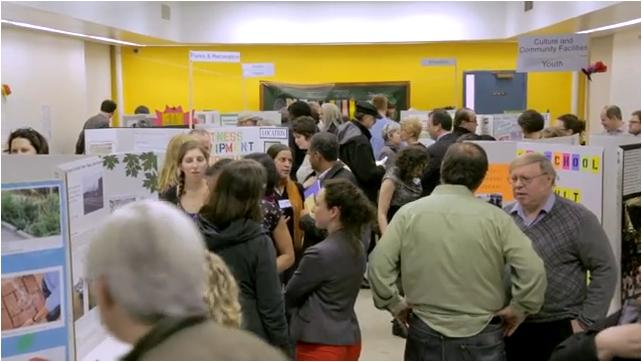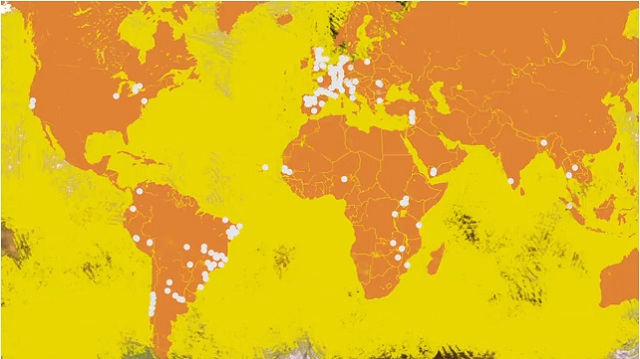In 2009, the 49th ward of Chicago became the first jurisdiction in the US to implement participatory budgeting, a democratic process in which community members directly decide how to allocate public or institutional funds. Last month, the 49th ward, now joined by three others in Chicago, concluded its 4th annual cycle of participatory budgeting. Across the four wards, over 2,500 voters decided how to spend $4 million of their aldermen’s discretionary funds. Projects voted on were proposed and developed by ward residents and included public art, playground improvements, and street and sidewalk repairs.
There to observe the process in action was a crowd of out-of-towners: over 200 activists, academics, community organizers, and government officials had come to Chicago to take part in a conference devoted to participatory budgeting (PB). Hailing from 17 countries and 70 cities, the participants met over three days in May to discuss diverse experiences of participatory budgeting and to learn about the model of PB taking root in Chicago and across the US and Canada.
“With over 1,500 PB processes around the world—not only in cities, but also states, schools, and other institutions—there’s a tremendous opportunity to share lessons that will shape PB both in the US and abroad” said Josh Lerner, the executive director of the Participatory Budgeting Project. A non-profit that develops and supports PB processes in the US and Canada, PBP co-organized the conference with the University of Illinois-Chicago’s Great Cities Institute.
Panels engaged various PB topics including its capacity to facilitate “citizenship learning”, the incorporation of tech tools and efforts to promote youth involvement. Sessions also explored the wide-ranging scale of PB processes: in “PB in Non-Profit Organizations,” panelists discussed ways in which the process could be used at a micro-level to make financial decisions within organizations; in “Scaling PB Up Beyond the City,” international researchers and practitioners explained how PB has been applied to the allocation of state or regional budgets, as in Rio Grande do Sul, Brazil and Kerala, India. There was also a workshop that led participants through a mock PB process in which they proposed, discussed and voted on neighborhood improvements for a hypothetical city.
Some of the most animated discussions addressed the role of PB in producing broader social transformations oriented toward economic and political democracy, ecological sustainability and social justice. Speakers on “The Future of PB” panel agreed that PB processes tend to start modestly—democratizing decisions around relatively small portions of large budgets as in New York City—but have immense potential as tools for simultaneously addressing communities’ immediate needs and fostering longer-term social change.
Yves Cabannes, Professor and Chair of Development Planning at University College London, reflected on his ongoing work researching and implementing PB across several continents.
“I see today that the World Social Forum motto and dream ‘another world is possible’ is taking shape as other worlds are being built. It’s not a dream anymore—it’s actually taking place.”
Participatory budgeting, said Cabannes, is in a unique position to connect projects on seemingly disparate fronts, including: eviction prevention and the right to housing; urban agriculture and food sovereignty; and worker and housing cooperatives, alternative currencies, and the solidarity economy. PB can offer a space to bring these projects into public dialogue, and more significantly, to finance them with local resources controlled by the community, as it has in Rosario, Argentina or Porto Alegre, Brazil. Already there have been glimmers of such possibilities in the fledgling American PB processes, with cities funding community gardens, grants for small businesses, and back-rent assistance to tenants at risk of eviction.
Other panelists discussed the possibility to extend the principles of PB into different realms of collective decision-making.
“There are so many other instances in which people should be making decisions about issues that affect their lives,” said Lerner. “PB is a space to explore how we can do that, which is no small challenge in large cities and complex societies.”
Areas in which the participatory budgeting model could be adapted include government revenue, public policy, city planning and the justice system. For now, however, groups like Community Voices Heard and the Right to the City Alliance are working to cultivate robust PB processes rooted in local communities. Following the lead of the pioneering Chicago process, rapidly growing PB initiatives have sprung up in New York, San Francisco, and Vallejo (California). Over two dozen other American and Canadian cities are seeing a push for PB.
Michelle Witthaus was one of many conference participants gathering lessons for developing PB in her city.
“I can’t wait to see this implemented in St. Louis,” said Ms. Witthaus, an Occupier-turned-aldermanic candidate who lost in a recent election but convinced the winning candidate to launch PB in her ward this year. “Learning about PB in practice made clear to me the distinct difference between citizen input and actual citizen empowerment enabled by participatory budgeting.”
In the coming months, PB in New York and Chicago will expand to new districts, and the pilot project in St. Louis will be joined by new processes in Boston, San Juan (Puerto Rico), and Hamilton (Ontario).
Isaac Jabola-Carolus is a Project Assistant with the Participatory Budgeting Project.
3 WAYS TO SHOW YOUR SUPPORT
- Log in to post comments













